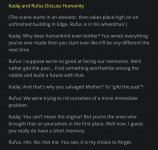Rydeen
In-KWEH-dible
There is definitely some genuine redemption there, albeit incomplete. The characters, especially Reno and Rufus, express regret and disgust for their past, but I will agree that Nojima has maintained a dash of ambiguity and mystery, between the Shinra monument and the Turks still sometimes using underhanded/shady methods to achieve Shinra's goals. Basically their goal is to rebuild a Shinra company whose desires are in support of rather than opposed to the well-being of the public. How that would actually play out, or what it actually looks like to the characters is debatable, but that's the vague vision we're provided with. Rufus was frail and terminally ill, derided Shinra's "lack of ethics" in his speech to Tseng in TKAA, perhaps objecting to Kyrie's fraud depending on how you read it, and also connected with ordinary people in distress after FFVII. The fact that Rufus funds WRO semi-anonymously and keeps himself rather hidden while enduring public humiliation (the nickname) is a good indication that he's not in it for glory or a PR stunt. There is certainly still the desire to surpass his father and regain power, but it's tempered by a desire for redemption. I like the mostly-but-not-100% redemption angle because it's more believable. There is definitely still a philosophy of the ends-justifies-the-means with them, or perhaps more succinctly, Realpolitik. Balancing Realpolitik with an idealistic vision is tricky and it seems they are still failing ethically in some ways. I'm not sure if this was writer intent, but imho Rufus has a pattern of being hypocritical and lacking a certain level of self-awareness, contradicting what he says/thinks vs. what he does or has done.
The writing does tend to teeter back and forth between them being fun and sympathetic <---> cold blooded killers. Sometimes in a rather disjointed way that doesn't truly handle the misdeeds, that can only be bridged through fanfiction at this point. Rebirth - I think Reno's VA dying and having his arc left hanging at such as critical point was very bad for him and Rude's character development.
Elena's "loose cannon" beatdown scene did make me cringe - I sometimes wonder if this was a poor attempt at fixing the then-fanon perception of her as being very non-threatening and pathetic.
Tseng comes off as the most hardened/bitter/worldly of the entire group and perhaps the character that changed the least.
I'd be really curious to see what the world looks like several decades in the future, and if the characters lose their way again.
The writing does tend to teeter back and forth between them being fun and sympathetic <---> cold blooded killers. Sometimes in a rather disjointed way that doesn't truly handle the misdeeds, that can only be bridged through fanfiction at this point. Rebirth - I think Reno's VA dying and having his arc left hanging at such as critical point was very bad for him and Rude's character development.
Elena's "loose cannon" beatdown scene did make me cringe - I sometimes wonder if this was a poor attempt at fixing the then-fanon perception of her as being very non-threatening and pathetic.
Tseng comes off as the most hardened/bitter/worldly of the entire group and perhaps the character that changed the least.
I'd be really curious to see what the world looks like several decades in the future, and if the characters lose their way again.
Last edited:

